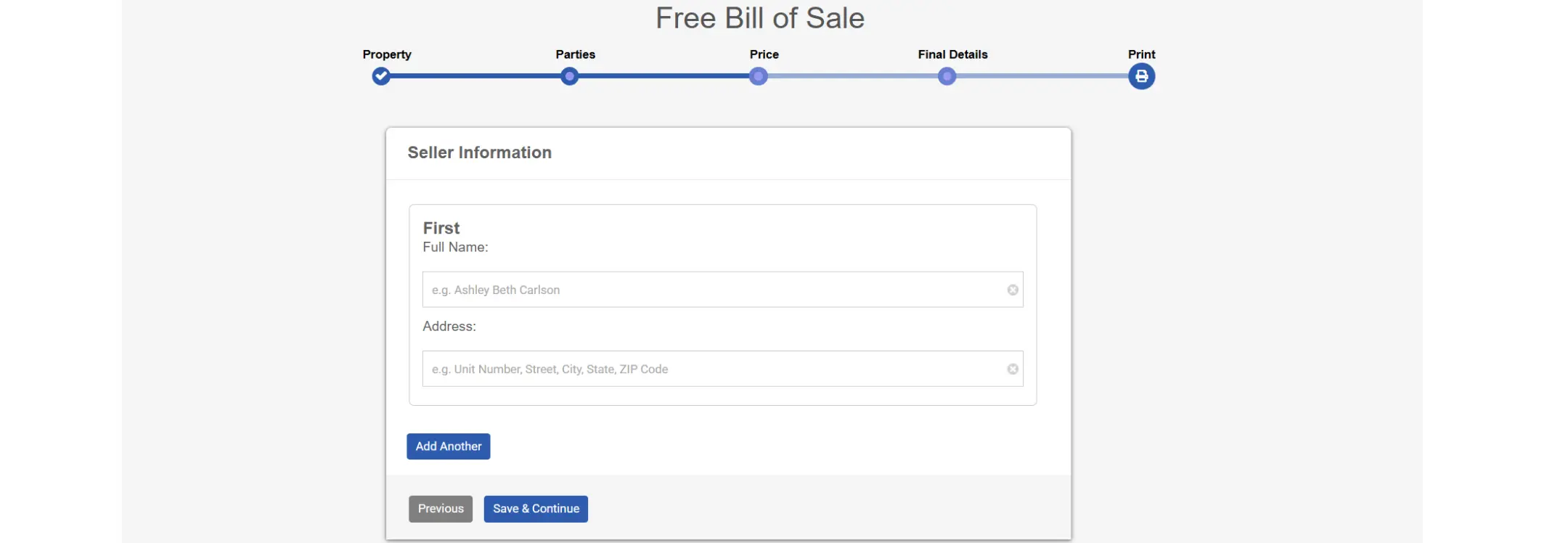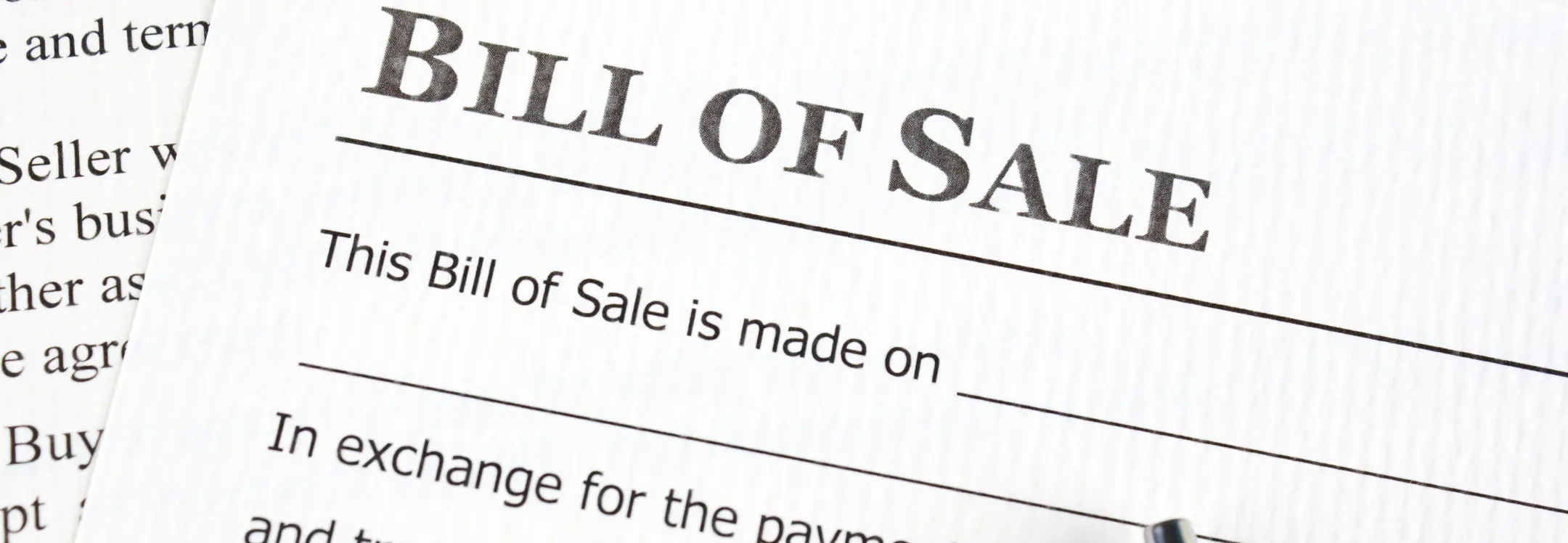Last Updated: February 23, 2026
TL;DR
- Bill of Sale proves that an ownership transfer has taken place and is often legally required for certain property like vehicles, boats, or trailers in the United States. Sales Agreement outlines the conditions of a sale before ownership changes hands.
- Use a Bill of Sale when the sale is immediate and final.
- Use a Sales Agreement when the sale is conditional, will take place in the future, or involves complex terms.
- You can use Ziji Legal Forms' Template to create a legally valid Bill of Sale
What Is a Bill of Sale
A Bill of Sale is a formal, written document that serves as proof that ownership of an item has been transferred from one party (the seller) to another (the buyer). It is most commonly used for significant personal property transactions, such as vehicles, trailers, boats, equipment, or other high-value goods, but can also apply to smaller assets.
Its primary purpose is to record the details of the sale in a way that is clear, verifiable, and legally recognized. By having a signed Bill of Sale, both parties have an official record that can be useful for resolving disputes, verifying ownership history, or meeting registration requirements with relevant authorities.
A complete Bill of Sale typically includes:
- Full legal names and contact details of both buyer and seller.
- Detailed description of the item being sold, including any identifying numbers like Vehicle Identification Numbers (VINs), serial numbers, or model details.
- Sale date and location of the transaction.
- Purchase price and agreed payment method.
- Odometer reading for vehicles, if applicable. “As-is” clause stating that the buyer accepts the item in its current condition unless warranties are specifically provided.
- Signatures of both parties, and in some cases, space for a witness or notary.
While a Bill of Sale is often associated with vehicle transactions, it is essentially a receipt with legal weight, it not only confirms that payment was made but also that ownership rights have been formally passed to the new owner.
For a step by step walkthrough of drafting and completing this document correctly, read our guide on how to create a Bill of Sale.
What Is a Sales Agreement?
A Sales Agreement is a legally binding contract that outlines the terms and conditions under which a sale will take place. Unlike a Bill of Sale, which is typically signed when the ownership of an item has already been transferred, a Sales Agreement is used before the transaction is complete to clearly define each party’s responsibilities and expectations.
Its main purpose is to prevent misunderstandings by putting the agreed terms in writing. This makes it useful for transactions where payment, delivery, or transfer of ownership will happen in the future, or where specific conditions must be met before the sale is finalized.
A well-drafted Sales Agreement usually includes:
- Details of the parties involved in the sale.
- Description of the item or property being sold.
- Purchase price and payment terms, including deposits or installment plans.
- Delivery or transfer conditions, such as location, date, and method.
- Warranties or guarantees, if offered.
- Conditions precedent, meaning actions or events that must occur before the sale closes.
- Signatures of both parties to confirm agreement.
Sales Agreements are versatile. They can be used for personal property, services, equipment, business interests, or real estate. Essentially, they set the roadmap for a successful transaction by clarifying obligations and reducing the risk of disputes later.

Bill of Sale vs. Sales Agreement – Key Differences
| Aspect | Bill of Sale | Sales Agreement |
|---|---|---|
| Purpose | Proof of completed sale and ownership transfer | Outlines terms before the sale is final |
| Timing | Signed after full payment and asset transfer | Signed before or while conditions are pending |
| Binding Effect | Transfers ownership immediately | Commits parties to complete the sale later |
| Use Cases | DMV vehicle title transfers, trailer sales, livestock, boats | Real estate, business sales, conditional deals |
| State Requirements | Often legally required for certain goods | Rarely mandated, but important for complex deals |
When to Use Each?
In the U.S., you would generally use a Bill of Sale any time a transaction involves the final transfer of ownership for personal property. This is especially important for items that must be registered with state agencies, such as vehicles, trailers, boats, certain firearms, and other high-value assets. A Bill of Sale acts as your legal proof of purchase, helps with registration or title changes, and offers protection if disputes arise later.
A Sales Agreement, on the other hand, is most appropriate when the sale involves conditions, payment plans, or future delivery. This includes more complex transactions such as business acquisitions, large equipment purchases, or real estate deals, where terms need to be agreed upon and documented before the property changes hands.
In short, if ownership changes the moment money is exchanged, use a Bill of Sale. If the sale has conditions or will be finalized later, use a Sales Agreement. Both documents ensure clarity and protection, but they serve different stages in the transaction process.
Creating a Legally Valid Bill of Sale Using Ziji Legal Forms
One convenient way to create a customized bill of sale is to use an online document assistant like Ziji Legal Forms. Ziji Legal Forms offers a guided template specifically for bills of sale, which you can fill out step by step and then download as a finished document. Here’s a walkthrough of how you could create a bill of sale using Ziji Legal Forms:
1. Go to the Ziji Legal Forms website and find the Bill of Sale form
Visit the Ziji Legal Forms’ homepage and look for the Bill of Sale document, listed under the “Financial” category. Click on Bill of Sale to get started. On the Bill of Sale page, you’ll usually see a description of the form and a button that says “Create Document.”
2. Start the document interview process
Click the “Create Document” button for the Bill of Sale. The platform will launch a guided questionnaire that collects all the required information for your bill of sale.
3. Enter the details of your sale
Ziji Legal Forms’ interface will guide you through these questions. You can simply type in the answers or select from options. It’s designed to be user-friendly, so you don’t have to worry about formatting or legal phrasing. The system does that for you.

4. Review your completed Bill of Sale
After you’ve answered all the prompts, the tool will generate a preview of your bill of sale document. Take a moment to review all the information. Make sure names are spelled correctly, addresses are right, the item description is accurate, and the price is correct. The preview will look like a nicely formatted Bill of Sale with all your details. If you spot anything that needs changing, you can go back in the questionnaire or edit the fields before finalizing. Ziji Legal Forms allows you to revise your answers as many times as needed before downloading, so you can tweak any detail.

5. Print your Bill of Sale
Open the PDF and print out the Bill of Sale. When you meet with the other party for the sale, both of you should sign the printed bill of sale.
Conclusion
In the U.S., the Bill of Sale finalizes the ownership transfer, often a legal requirement for registering vehicles, boats, or trailers, whereas a Sales Agreement lays the groundwork for a sale that will occur later or under agreed conditions. Always check your state requirements, because the rules for notarization, required fields, and filing differ.
Bill of Sale FAQS
Is a bill of sale legally binding without a witness?
While not required, having a witness (especially for high-value items) can strengthen the legal validity of the transaction.
Can a bill of sale be used for gifted items (with $0 value)?
Yes, but it should clearly state the transfer is a gift and mention $0 or nominal value (e.g., $1) for record purposes.
Can I create a digital or electronic bill of sale?
Electronic bills of sale are valid in most states as long as they meet e-signature laws (like ESIGN or UETA compliance).
Do I need a separate bill of sale for each item sold?
Not necessarily. Multiple items can be listed in a single bill of sale if properly described and valued individually.
Can I cancel or amend a bill of sale after signing?
A signed bill of sale can only be canceled or amended if both parties agree, ideally with a written amendment or cancellation notice.
What jurisdictions can use our bill of sale?
You can use our template to create a legal and valid bill of sale for the following jurisdictions:
| Alabama (AL) | Alaska (AK) | Arizona (AZ) | Arkansas (AR) | California (CA) |
| Colorado (CO) | Connecticut (CT) | Delaware (DE) | District of Columbia (DC) | Florida (FL) |
| Georgia (GA) | Hawaii (HI) | Idaho (ID) | Illinois (IL) | Indiana (IN) |
| Iowa (IA) | Kansas (KS) | Kentucky (KY) | Louisiana (LA) | Maine (ME) |
| Maryland (MD) | Massachusetts (MA) | Michigan (MI) | Minnesota (MN) | Mississippi (MS) |
| Missouri (MO) | Montana (MT) | Nebraska (NE) | Nevada (NV) | New Hampshire (NH) |
| New Jersey (NJ) | New Mexico (NM) | New York (NY) | North Carolina (NC) | North Dakota (ND) |
| Ohio (OH) | Oklahoma (OK) | Oregon (OR) | Pennsylvania (PA) | Rhode Island (RI) |
| South Carolina (SC) | South Dakota (SD) | Tennessee (TN) | Texas (TX) | Utah (UT) |
| Vermont (VT) | Virginia (VA) | Washington (WA) | West Virginia (WV) | Wisconsin (WI) |
| Wyoming (WY) |
GET STARTED FOR FREE
Create your
Get Started For Free

